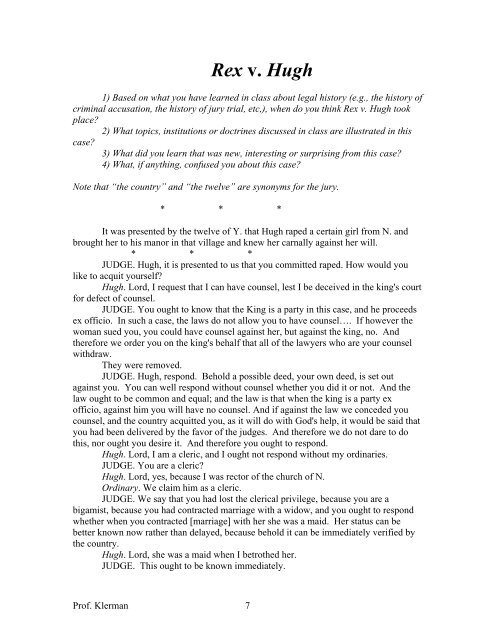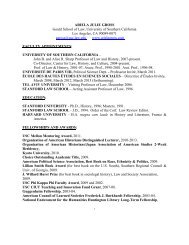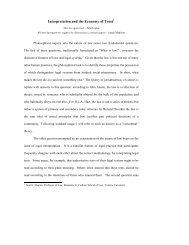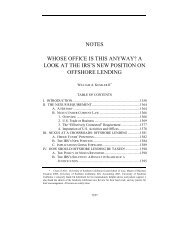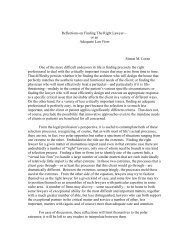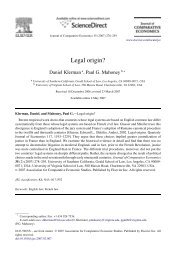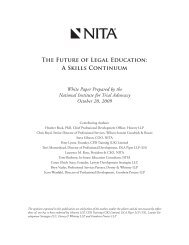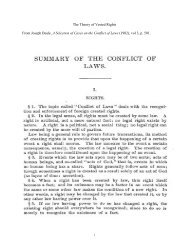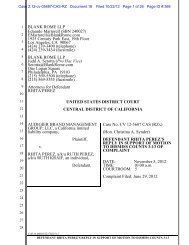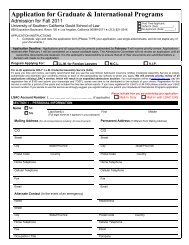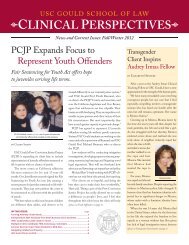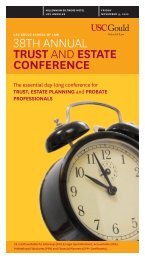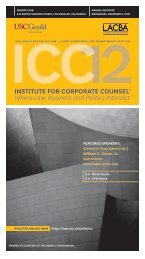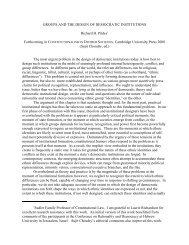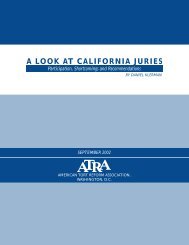Rex v. Hugh
Rex v. Hugh
Rex v. Hugh
You also want an ePaper? Increase the reach of your titles
YUMPU automatically turns print PDFs into web optimized ePapers that Google loves.
<strong>Rex</strong> v. <strong>Hugh</strong><br />
1) Based on what you have learned in class about legal history (e.g., the history of<br />
criminal accusation, the history of jury trial, etc,), when do you think <strong>Rex</strong> v. <strong>Hugh</strong> took<br />
place?<br />
2) What topics, institutions or doctrines discussed in class are illustrated in this<br />
case?<br />
3) What did you learn that was new, interesting or surprising from this case?<br />
4) What, if anything, confused you about this case?<br />
Note that “the country” and “the twelve” are synonyms for the jury.<br />
* * *<br />
It was presented by the twelve of Y. that <strong>Hugh</strong> raped a certain girl from N. and<br />
brought her to his manor in that village and knew her carnally against her will.<br />
* * *<br />
JUDGE. <strong>Hugh</strong>, it is presented to us that you committed raped. How would you<br />
like to acquit yourself?<br />
<strong>Hugh</strong>. Lord, I request that I can have counsel, lest I be deceived in the king's court<br />
for defect of counsel.<br />
JUDGE. You ought to know that the King is a party in this case, and he proceeds<br />
ex officio. In such a case, the laws do not allow you to have counsel…. If however the<br />
woman sued you, you could have counsel against her, but against the king, no. And<br />
therefore we order you on the king's behalf that all of the lawyers who are your counsel<br />
withdraw.<br />
They were removed.<br />
JUDGE. <strong>Hugh</strong>, respond. Behold a possible deed, your own deed, is set out<br />
against you. You can well respond without counsel whether you did it or not. And the<br />
law ought to be common and equal; and the law is that when the king is a party ex<br />
officio, against him you will have no counsel. And if against the law we conceded you<br />
counsel, and the country acquitted you, as it will do with God's help, it would be said that<br />
you had been delivered by the favor of the judges. And therefore we do not dare to do<br />
this, nor ought you desire it. And therefore you ought to respond.<br />
<strong>Hugh</strong>. Lord, I am a cleric, and I ought not respond without my ordinaries.<br />
JUDGE. You are a cleric?<br />
<strong>Hugh</strong>. Lord, yes, because I was rector of the church of N.<br />
Ordinary. We claim him as a cleric.<br />
JUDGE. We say that you had lost the clerical privilege, because you are a<br />
bigamist, because you had contracted marriage with a widow, and you ought to respond<br />
whether when you contracted [marriage] with her she was a maid. Her status can be<br />
better known now rather than delayed, because behold it can be immediately verified by<br />
the country.<br />
<strong>Hugh</strong>. Lord, she was a maid when I betrothed her.<br />
JUDGE. This ought to be known immediately.<br />
Prof. Klerman 7
And he asked the twelve if <strong>Hugh</strong> [married his wife when she was a widow]. The<br />
twelve said on oath that she was a widow when Lord <strong>Hugh</strong> contracted [marriage] with<br />
her. But it should be noted that they were not sworn again, because they were sworn first.<br />
JUDGE. And thus the court considers that you ought to respond as a layman, and<br />
do you consent to these worthy men of the twelve, because we know that they do not<br />
want to lie for us.<br />
<strong>Hugh</strong>. Lord, I was accused by them; therefore I will not consent to them. In<br />
addition, Lord, I am a knight, and I ought not to be judged except by my peers.<br />
And knights were named. And he was asked wither he wanted to set forward any<br />
challenges against them.<br />
<strong>Hugh</strong>. Lord, I do not consent to them, you can take whatever inquest you want ex<br />
officio, but I will not consent<br />
JUDGE. Lord <strong>Hugh</strong>, if you will to consent to them, with God's help, they will<br />
decide for you, if you will consent to them. And if you want to reject the common law,<br />
you will bear the penalty ordained for it, that is "one day you will eat and the other you<br />
will drink; and on the day you drink you will not eat, and the reverse; and you will eat<br />
barley bread and not with salt, and water [not wine or beer] etc.", explaining to him at<br />
length whence it would not be good to die in this way, but it would be better to consent to<br />
them.<br />
<strong>Hugh</strong>. I will consent to my peers, but not to the twelve through whom I was<br />
accused. You ought to hear my challenges against them.<br />
JUDGE. Freely. Let the challenges be read; but if you know any reason why they<br />
ought to be removed, say it in a single voice or in writing.<br />
<strong>Hugh</strong>. Lord, because I do not know how to read, I request my counsel.<br />
JUDGE. No, because it touches the lord King.<br />
<strong>Hugh</strong>. You ought to have the challenges and you ought to read them.<br />
JUDGE. No, because they ought to be set out by your mouth.<br />
<strong>Hugh</strong>. I don't know how to read them.<br />
JUDGE. How is it that you wanted to help yourself with the clerical privilege, and<br />
now you don't know how to read your challenges.<br />
<strong>Hugh</strong> stood silent as if confused.<br />
JUDGE. Don't be stupified, now is the time to speak.<br />
JUDGE (to Lord N. de Leicester). Do you want to read Lord <strong>Hugh</strong>'s challenges?<br />
Lord N. Lord, may I have the paper that he has in his hands?<br />
This was allowed.<br />
Lord N. Many challenges are named here against many people, do you want me<br />
to read them publicly?<br />
JUDGE. No, rather you should read them to the prisoner secretly, because they<br />
ought to be stated by his mouth.<br />
And it was done in this way. When they had been propounded by his mouth,<br />
because there were found to be truly challenged, those against whom he had propounded<br />
were removed from the inquest.<br />
JUDGE. We accuse Lord <strong>Hugh</strong> of rape of a certain woman. He denies. He was<br />
asked how he wants to acquit himself; he said through the country. For good or evil, he<br />
put himself on you. Therefore we order you in virtue of your oath to tell us whether Lord<br />
<strong>Hugh</strong> raped this woman or not.<br />
Prof. Klerman 8
The Twelve. We say that she was raped by force by Lord <strong>Hugh</strong>'s men.<br />
JUDGE. Did <strong>Hugh</strong> consent to the deed or not?<br />
The Twelve. No<br />
JUDGE. Did they now her carnally?<br />
The Twelve. Yes.<br />
JUDGE. Against the woman's will or with her consent?<br />
The Twelve. With her consent<br />
I believed that what ought to be here was later lost.<br />
JUDGE. Lord <strong>Hugh</strong>, because they acquit you, we acquit you.<br />
[Original in Latin. edited and translated by Prof. Klerman. ]<br />
Prof. Klerman 9
Sir Thomas Smith, De Republica Anglorum (1560s)<br />
1) How is Smith’s description of trial similar to <strong>Rex</strong> v. <strong>Hugh</strong>?<br />
2) How is it different?<br />
3) What did you see that was interesting or surprising?<br />
* * *<br />
In the towne house, or in some open or common place, there is a tribunall or place of<br />
judgement made aloft upon the highest bench, there sitteth the two or three Judges which<br />
be sent downe in Commission in the midst. … Then the cryer crieth, and commaundeth<br />
silence. One of the Judges briefely telleth the cause of their comming, and giveth a good<br />
lesson to the people. Then the prisoners are called for by name, and bidden to aunswere<br />
to their names. … There the clarke speaketh first to one of the prisoners: A.B. come to<br />
the barre, hold up thy hand. The clarke goeth on: A.B. thou by the name of A.B. of such a<br />
towne, in such a countie, art endicted, that such a day, in such a place, thou hast stolen<br />
with force and armes an horse, which was such a ones, of such a colour, to such a valor,<br />
and carried him away feloniouslie, and contrarie to the peace of our soveraigne Ladie the<br />
Queene. What sayest thou to it, art thou guiltie or not guiltie? If he will not aunswere, or<br />
not aunswere directly, guiltie or not guiltie, after he hath beene once or twise so<br />
interrogated, he is judged mute, that is dumme by contumacie, and his condemnation is to<br />
be pressed to death…<br />
If he pleade not guiltie, as commonly all theeves, robbers, and murtherers doe, …<br />
the Clarke asketh him how he will be tryed, and telleth him he must saie, by God and the<br />
Countrie, for these be the words formall of this triall after Inditement, and where the<br />
Prince [the King] is partie: if the prisoner doe say so, I will be tryed by God and the<br />
Countrie, then the Clarke replyeth, Thou hast beene endicted of such a crime, &c. Thou<br />
hast pleaded not guiltie: being asked how thou wilt be tryed, thou hast aunswered by God<br />
and by the Countrie. Loe these honest men that be come here, be in the place and stead of<br />
thy Countrie: and if thou hast any thing to say against any of them, looke upon them well<br />
and nowe speake, for thou standest upon thy life and death. Then calleth he in the first<br />
[juror]: B.C. come to the booke, and so giveth him an othe to goe uprightlie betwixt the<br />
Prince and the prisoner, &c. If the prisoner objecteth nothing against him, he calleth an<br />
other, and so an other, till there be xii. or above: and for the most part the prisoner can<br />
say nothing against them, for they are chosen but for that day, and are unknowen to him,<br />
nor they know not him, as I said before being substantial yeomen, that dwell about the<br />
place, or at the least in the hundred, or neere where the felonie is supposed to be<br />
committed, men acquainted with daily labour and travaile, and not with such idle menne,<br />
as be readie to doe such mischiefes.<br />
Prof. Klerman 10
When the enquest is full .. [t]he crier … sayth aloude: If any can give any<br />
evidence, or can saie any thing against the prisoner, let him come nowe, for he standeth<br />
upon his deliverance. … The Judge first after they [the witnesses] be sworne, asketh first<br />
the partie robbed, if he knowe the prisoner, and biddeth him looke upon him: he saith<br />
yea, the prisoner sometime saith nay. The partie pursuivaunt [victim/prosecutor] [says] I<br />
knowe thee well ynough, thou robbest me in such a place, thou beatest mee, thou tookest<br />
my horse from mee, and my purse, thou hadst then such a coate and such a man in thy<br />
companie: the theefe will say no, and so they stand a while in altercation, he telleth al that<br />
he can say: after him likewise all those who were at the apprehension of the prisoner, or<br />
who can give any indices or tokens which we call in our language evidence against the<br />
malefactor. When the Judge hath heard them say inough, he asketh if they can say any<br />
more: if they say no, then he turneth his speeche to the enquest [jury]. Good men (saith<br />
he) ye of the enquest, ye have heard what these men say against the prisoner, you have<br />
also heard what the prisoner can say for himselfe, have an eye to your othe, and to your<br />
duetie, to God and the Prince and doe that which God shall put in your mindes to the<br />
discharge of your consciences, and marke well what is saide. Thus sometime with one<br />
enquest is passed to the number of ij. or iij. prisoners: For if they should be charged with<br />
more, the inquest will say, my Lord, we pray you charge us with no more, it is ynough for<br />
our memorie. Many times they are charged but with one or two. At their departing, they<br />
have in writing nothing given them, but the enditement, the clarke repeating to them the<br />
effect of it, and shewing more, that if they finde him guiltie, they shall enquire what<br />
goods, lands, and tenements, the saide person had at the time of the felonie committed:<br />
and if they finde any, they shall bring it in: if no, they shal say so. If they finde him not<br />
guiltie, they shall enquire whether he fled for the felonie or no.<br />
And there is a bailife to waite upon them, and to see that no man doe speake with<br />
them, and that they have neither bread, drinke, meate, ne fire brought to them, but there<br />
to remaine in a chamber together till they agree…. By that time that the enquests for the<br />
prisoners be dispatched, it is commonlie dinner time, the Judges and Justices goe to<br />
dinner, and after dinner returne to the same place: … The enquests have no sooner agreed<br />
upon their charge one way or other, but they tell the Bailife, and pray to be heard, and<br />
considering that they be themselves all this while as prisoners as I saide before, it is no<br />
marvell. The prisoners be sent for againe to the barre, the enquest which hath agreed, is<br />
called for eche one of the Jurie by his name, to which he answereth. Then the clarke<br />
asketh if they be agreed, and who shall speake for them. One or moe saith yea. He that<br />
speaketh for them all is called for foreman, and commonlie it is he that is first sworne:<br />
then the prisoner is bidden to holde up his hande. The clarke saith unto him, Thou art<br />
endicted by the name of A. of such a place, &c. being therefore arraigned thou pleadest<br />
thereto not guiltie, being asked howe thou would be tryed, thou saydst by God and thy<br />
countrie. These honest men were given to thee by God and thy Prince for thy Countrey:<br />
Hearken what they say. Then he asketh of the enquest, what say you? Is he guiltie or not<br />
guiltie? The foreman maketh aunswere in one worde, guiltie, or in two, not guiltie: the<br />
one is deadlie, the other acquiteth the prisoner. So that neither Judge nor Justice hath to<br />
doe, or can reverse, alter or chaunge that matter. …<br />
Of him whom the xij. men pronounce guiltie, the Judge asketh what he can now<br />
say for himself: if he can reade, he demaundeth his Clergie. … If the condemned man<br />
demandeth to be admitted to his booke, the Judge commonly giveth him a Psalter, and<br />
Prof. Klerman 11
turneth to what place he will. The prisoner readeth as well as he can (God knoweth<br />
sometime very slenderly:) then asketh of the Bishops commissarie, legit ut clericus [Can<br />
he read like a cleric]? The commissarie must say legit [he reads] or non legit [he does not<br />
read], for these be wordes formall, and our men of Lawe be verie precise in their words<br />
formall. If he say legit, the Judge proceedeth no further to sentence of death: if he say<br />
non, the Judge forthwith, or the next day proceedeth to sentence, which is doone by word<br />
of mouth onelie:<br />
[From http://www.constitution.org/eng/repang.htm, Ch 23. Edited by Prof. Klerman]<br />
Prof. Klerman 12


